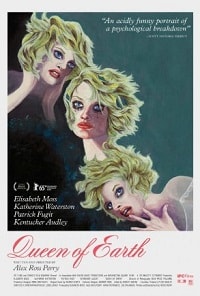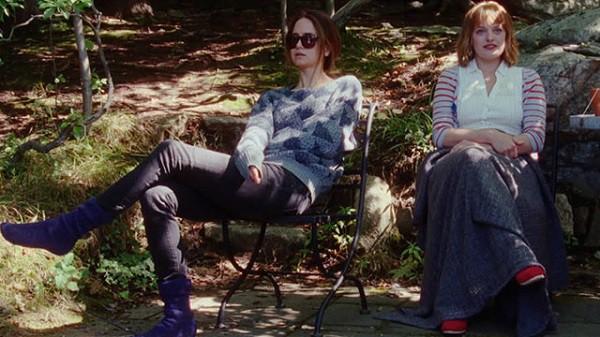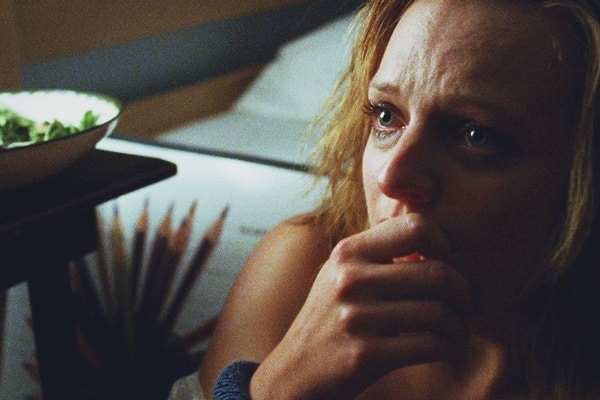
Written & Directed by Alex Ross Perry
USA, 2015
There are moments in Alex Ross Perry’s Queen of Earth that feel so intimate you almost hold your breath for fear of being overheard. There are also moments of artificiality that feel so contrived you’re left wondering what Perry was thinking. Swirling at the center of this perplexing drama is a revelatory performance from Elisabeth Moss, who perfectly captures the brittle yet impenetrable nature of mental illness. While its unabashed hostility and nasty characterizations prevent this from being an enjoyable film, it is also undeniably fascinating. Required viewing for hardcore cinephiles.
It is perfectly acceptable for a filmmaker to ask dozens of questions he has no intention of answering. The problems start when the filmmaker loses track of what the questions are about. Queen of Earth wallows in its ambiguity so deeply that it eventually suffocates. Much like Neil LaBute’s brilliant but soul-crushing debut features, In the Company of Men and Your Friends & Neighbors, this is a riveting film about ugly people doing ugly things to each other. Unlike LaBute’s seminal work, however, Perry’s meditation on self-obsession and vanity never builds toward anything. Any grain of satisfaction you might take from better understanding the human condition is frustratingly obscured by Perry’s shifting focus. It’s not that his film is overly-complicated; it just doesn’t play fair.
The first half of the film is an exquisite, penetrating look at the eroding friendship of two independent-minded thirtysomethings, Catherine (Moss) and Virginia (Katherine Waterston). Catherine is coming off a bad break-up with James (Kentucker Audley) and the suicide of her depressed father; a famous artist for whom she also worked. Virginia offers the solace of her family’s secluded lakeside cabin. It’s the perfect place for a week of introspection and confession. “I’m in this self-perpetuating cycle of defeat,” laments Catherine. Virginia’s existential response, “You can get out of someone else’s cycle but you can’t get out of your own,” offers little consolation to someone in deep spiritual pain.
 This pain becomes the second-half focus of Queen of Earth, which, predictably, suffers from the inward turn. By nature, emotional breakdowns are inherently cinematic, but dramatically uninvolving. As a character descends deeper and deeper into their own private hell, they leave everyone else outside. Moss does an amazing job conveying this disintegration, but the further Virginia recedes into the background the less insight we get into Catherine’s troubled mind. Even more puzzling is the passive-aggressive bullying between Catherine and Virginia’s neighborhood fling, Rich (Patrick Fugit). “You’ll never be your father!” is a simpleminded taunt that belongs on the schoolyard, not in a mature psychological drama.
This pain becomes the second-half focus of Queen of Earth, which, predictably, suffers from the inward turn. By nature, emotional breakdowns are inherently cinematic, but dramatically uninvolving. As a character descends deeper and deeper into their own private hell, they leave everyone else outside. Moss does an amazing job conveying this disintegration, but the further Virginia recedes into the background the less insight we get into Catherine’s troubled mind. Even more puzzling is the passive-aggressive bullying between Catherine and Virginia’s neighborhood fling, Rich (Patrick Fugit). “You’ll never be your father!” is a simpleminded taunt that belongs on the schoolyard, not in a mature psychological drama.
Structurally, Perry sets a nifty framework in which Catherine and Virginia can spar. There’s a long history between these two women, most of which has transpired between their intermittent rendezvous. Each considers the other a spoiled brat who’s just looking for an excuse to toss aside her ambitions like last season’s fashion. Through flashbacks and dreamy ramblings, we see a relationship of convenience that has suddenly become quite inconvenient. Both Catharine and Virginia delight in judging the other’s insecurities, but it’s the moments of quiet reflection that pack the greatest wallop. When these two complicated, damaged women are allowed to talk, Queen of Earth strips bare the pretense of ego and rationalization. It’s raw, intimate stuff, which makes the goofy cackling and pointless sniping in the film’s final act feel even less satisfying.
 There’s a lot of fodder for drama here, but most of it is disconnected from the central relationship that fuels the story. Catherine’s relationship with her father remains superficial, for instance, as does the artistic ability she (apparently) sacrificed in order to be his doting assistant. Dinner parties and mysterious strangers function as little more than excuses for artistic embellishments. “I could murder you right now and no one would ever know,” a giddy Catherine confides to a drunken man she found passed-out on the front lawn. And then… we move on without so much as a reaction from the man. It’s merely a provocation that serves no greater purpose to the film’s larger themes or narrative. Simply put, we care about the relationship between Catherine and Virginia; everything else is a distraction.
There’s a lot of fodder for drama here, but most of it is disconnected from the central relationship that fuels the story. Catherine’s relationship with her father remains superficial, for instance, as does the artistic ability she (apparently) sacrificed in order to be his doting assistant. Dinner parties and mysterious strangers function as little more than excuses for artistic embellishments. “I could murder you right now and no one would ever know,” a giddy Catherine confides to a drunken man she found passed-out on the front lawn. And then… we move on without so much as a reaction from the man. It’s merely a provocation that serves no greater purpose to the film’s larger themes or narrative. Simply put, we care about the relationship between Catherine and Virginia; everything else is a distraction.
Perry must be commended, however, for his uncompromising commitment to the despairing tone. From the tight close-ups that seem to linger for days, to the (perhaps too) foreboding soundtrack by Keegan DeWitt, Perry’s film is balanced on a precarious edge. It’s a glorified stage play adorned with greenery and invisible demons; a Felliniesque meditation on madness that jumps headlong into the spaces we so carefully censor. Catherine’s mind, much like Virginia’s secluded lake home, is a great place to visit but you’d never want to live there.

Queen of Earth is a compelling film that, unfortunately, gets lost somewhere between a relationship drama and an immersive plunge into mental illness. A promising start feels largely squandered in a frustrating series of pretentious flourishes. Still, there is no denying the power of Moss’ performance and the overwhelming sense of dread that Perry creates. Both are palpable forces that make you appreciate the artistry on display, even if you can’t necessarily enjoy it.

